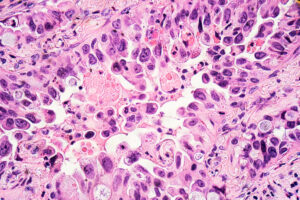Lung Cancer Research
Lung cancer research allows doctors to explore new treatment methods and even new testing options to improve the chance of an early diagnosis. Clinical trials are some of the most common forms of lung cancer research. Learn about the latest lung cancer research and treatments, and get help affording medical care through Lung Cancer Group.
Finding a Cure Through Lung Cancer Research
 While there is no cure for lung cancer at this time, ongoing lung cancer research offers the best chances of helping patients.
While there is no cure for lung cancer at this time, ongoing lung cancer research offers the best chances of helping patients.
Studies into new lung cancer treatments may help improve the life expectancy of patients by years or even decades. Further, research into testing may help diagnose lung cancer before it has spread.
Patients can take part in lung cancer research by participating in clinical trials, where new treatment methods are tested. Many patients have seen positive results after participating in clinical trials.
It typically costs nothing for patients to join a lung cancer research trial, but other treatments can be very expensive. Fortunately, if you were exposed to asbestos and later developed lung cancer, you may be eligible for financial assistance. Learn how Lung Cancer Group can help with a free case review.
- Access Financial Aid and Justice
- Learn About Your Options
- Contact Us for Free

Lung Cancer Treatment Research
Many aspects of lung cancer research focus on improving currently used treatments and developing newer ones. Learn about research into lung cancer treatments below.
Surgical Techniques
Doctors are looking for ways to improve the effectiveness of lung cancer surgeries while minimizing the risk of complications.
For instance, some studies are comparing the removal of early-stage non-small cell lung cancer (NSCLC) via lobectomy (removal of a lung lobe) to removal by segmentectomy or wedge resection (which removes a portion of lung tissue rather than a whole lung).
Doctors are making this comparison to see if they can treat early-stage NSCLC while preserving as much lung tissue as possible so patients have a better quality of life post-lung cancer surgery.
Improving Radiation
Doctors are also looking for ways to more effectively use radiation when treating lung cancer. Radiation therapy uses high-energy rays to damage the DNA of lung cancer cells. This prevents them from growing and dividing.
Recently, doctors have been focusing on stereotactic radiation therapy, which uses unique equipment to position the patient and accurately deliver precisely-focused radiation beams to treat lung cancer tumors and improve life expectancy.
Immunotherapy
Immunotherapy for lung cancer aims to boost the body’s immune system to fight off cancer cells. There are several types of immunotherapy, including immune checkpoint inhibitors, which prevent cancer cells from blocking the immune system.
Thanks to successful clinical trials, some immunotherapy drugs have been approved by the U.S. Food and Drug Administration (FDA) to treat lung cancer and mesothelioma.
Several studies are being done to investigate immunotherapy drug combinations as well as using this treatment alongside others like chemotherapy and surgery.
One 2023 study in Translational Lung Cancer Research explored the success of immune checkpoint inhibitors that target PD-1 and PD-L1 proteins within tumors. Patients in the study with metastatic (cancer cells have spread) NSCLC saw ongoing benefits of the treatment even after 5 years.
Need help affording immunotherapy and other treatments? Get a free case review to see if you can access financial compensation.
- Access Financial Aid and Justice
- Learn About Your Options
- Contact Us for Free



Targeted Therapy
Targeted therapy identifies and attacks lung cancer cells while causing less damage to normal cells. Several targeted therapies have become available for advanced lung cancer patients in recent years thanks to ongoing lung cancer research.
Some targeted therapies include:
- Anaplastic lymphoma kinase (ALK) inhibitors target cancer-causing modifications in the ALK protein. Researchers continue to refine these drugs for the 5% of NSCLC patients with ALK gene alterations. ALK inhibitor drugs include alectinib (Alecensa), brigatinib (Alunbrig), and lorlatinib (Lorbrena).
- BRAF inhibitors minimize the growth of NSCLC tumors with BRAF gene mutations. BRAF inhibitors drugs include dabrafenib (Tafinlar) and trametinib (Mekinist).
- EGFR inhibitors block the activity of the epidermal growth factor receptor (EGFR) protein. EGFR proteins are found at high levels in certain lung cancers, causing them to grow fast. Lung cancer EGFR drugs include afatinib (Gilotrif), dacomitinib (Vizimpro), and osimertinib (Tagrisso).
- ROS1 inhibitors block the ROS1 protein, which is involved in cell growth. These drugs are meant to treat NSCLC patients who have variations of the ROS1 gene. ROS1 inhibitors include crizotinib (Xalkori) and entrectinib (Rozlytrek).
Researchers are also looking at protein and genes within lung cancer tumors that could be targeted with new drugs.
For example, doctors are studying how targeted therapies can treat mutations in the neuregulin-1 gene (NRG1), which frequently occur in patients with invasive mucinous adenocarcinomas of the lung.
Personalized Drug Therapy
Researchers are observing features of lung cancer tumors to predict which treatment methods will work well for a patient’s specific case.
This research is also called precision medicine as it is carefully personalized for a patient’s lung cancer type, cell type, and other health factors.
Oncologists stated in the Journal of Thoracic Disease that personalized medical oncology (drug-based cancer treatment) plans are critical for patient care because lung cancer is such a “biologically diverse disease.”
Palliative Care
Palliative patient care can be an important support treatment option for those diagnosed with metastatic or late-stage lung cancer. This treatment can ease symptoms and quality of life for many patients, but according to a 2023 survey published in Supportive Care in Cancer less than half of patients meet with palliative care doctors and even fewer understood what it was.
Another group of researchers stated in the Journal of Hospice and Palliative Nursing in 2023 that, while lung cancer treatment has advanced significantly, thoracic oncology needs to continue exploring palliative care options for all patients.
Need help affording emerging lung cancer treatment or palliative care? Contact us today to see how we might be able to help you access legal compensation for asbestos-related lung cancer.
Lung Cancer Diagnosis Research
A key area of research involves improving ways to diagnose lung cancer. Doctors want to diagnose patients faster and more accurately. Learn about recent research into improving lung cancer diagnosis below.
Artificial Intelligence to Support Identifying Cell Type


The artificial intelligence program was successfully able to determine differences between two common types of lung cancer, adenocarcinomas and squamous cell carcinomas. According to the National Cancer Institute, this is an important move forward since many oncology departments have a hard time differentiating these two presentations of lung cancer.
Additionally, since each type of lung cancer requires unique treatment approaches, this fast-tracked diagnosis may help patients get care faster.
Biomarkers
Biomarkers are substances, such as genetic material or proteins, that are naturally found in the body. Certain types of lung cancer can change the amount of one or more biomarkers in a patient’s body.
As such, doctors can use biomarkers to help determine if a patient may have lung cancer or not.
Scientists are studying the following lung cancer biomarkers:
- Circulating tumor cells and CXCR4 expression
- Estrogen receptor-alpha
- FGFR1 amplification
- KRAS
- Pro-surfactant protein B
Doctors can measure lung cancer biomarkers by extracting tissue or body fluids.
Low-Dose CT Scans
Computed tomography (CT) scans are a common type of imaging test to detect and diagnose lung cancer. However, researchers are finding even more benefits to the scans.
Recently, the National Lung Screening Trial looked at the effectiveness of X-rays versus CT scans to detect lung cancer in those with a history of smoking. CT scans were 4 times more likely to detect lung cancer early, allowing patients to receive lifesaving treatments.
Liquid Biopsies
Doctors have been looking for new ways to use liquid biopsies to detect cancer earlier. Compared to tissue biopsies, which are the standard method for diagnosing lung cancer, liquid biopsies are minimally invasive.
Doctors can perform liquid biopsies by taking fluid samples and evaluating them for lung cancer biomarkers. One 2023 study published in the Swiss medical journal Diagnostics, found that liquid biopsies were helpful in lung cancer diagnosis especially when taking tissue samples was not possible.
Additionally, liquid biopsies can significantly decrease the turnaround time for lab reports, meaning lung cancer patients can get treatments faster.
Endobronchial Ultrasound Biopsy
With an endobronchial ultrasound biopsy, doctors use an ultrasound along with a special tool called a bronchoscope to gather tissue samples from the lymph nodes and lungs. It is used to diagnose lung cancer and see whether it has spread.
Endobronchial ultrasound biopsy is less invasive than a other lung cancer screening tests like mediastinoscope or thoracoscopy, which lead small tubes and a camera through the body to take tissue samples.
A 2023 research study in the Journal of Thoracic Disease has also revealed that this test may be safer for patients who are already struggling with lung function.
Where Does Lung Cancer Research Take Place?
Lung cancer research is taking place in hospitals across the country, and new studies occur every year.
Leading hospitals conducting lung cancer research programs include:
- Cleveland Clinic
- Johns Hopkins Medicine
- Lung Cancer Research Foundation
- Mayo Clinic
- Memorial Sloan Kettering Cancer Center
Lung cancer research is typically funded with grants or universities from the government.
Find Clinical Trials and Emerging Lung Cancer Treatments
Clinical trials can connect patients with emerging treatments that they would not otherwise have access to.
If you’re interested in joining a clinical trial for and participating in lung cancer research, contact your cancer care team. Your oncologists can determine if you are eligible to join an ongoing clinical trial.
Unfortunately, some patients may have to travel to take part in clinical trials, which can increase the cost of care. If your lung cancer was caused by asbestos exposure, we may be able to help you and your family get financial aid.
Get started today with a free case review to learn how we can help you.
Lung Cancer Research FAQs
What is the current research on lung cancer?
A lot of research is currently being done on lung cancer.
Current lung cancer research topics include:
- Expanding palliative or alternative care options
- Exploring the effectiveness of early detection tests, such as liquid biopsies and CT scans
- Finding effective immunotherapy or chemotherapy combinations
- Improving surgical techniques, especially for late-stage patients
Are there any breakthroughs in lung cancer?
Immunotherapy was considered a breakthrough for cancer treatment in 2018 when researchers saw that immune checkpoint inhibitors were successful in treating metastatic colorectal cancer. The combination of immunotherapy drugs nivolumab and ipilimumab was awarded the 2018 prize in Physiology and Medicine.
Since this breakthrough, researchers have been exploring additional immunotherapy combinations for more cancers including lung cancer, mesothelioma, and breast cancer.
What is the new treatment for lung cancer in 2023?
Several new treatments for lung cancer are being studied in 2023 after showing success in trials conducted within the last few years.
New lung cancer treatments include:
- Comparing the most effective surgeries, such as removing a piece of a cancerous lung lobe instead of removing a whole lobe
- Using ALK inhibitor drugs to treat NSCLC patients with ALK gene alterations
- Using the FDA-approved immunotherapy drug, atezolizumab (Tecentriq), as an adjuvant treatment after chemotherapy and surgery for patients with NSCLC that has spread locally
Will lung cancer be cured in the future?
Possibly. At this time, there’s no cure for lung cancer. However, recent breakthroughs in lung cancer research suggest that diagnosis and treatment options are only getting better.
Lung Cancer Group remains hopeful that lung cancer will one day be cured.

